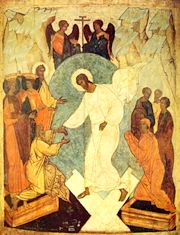Resurrection of Christ
The Gospels narrate that after Christ's Passion and suffering on the Cross, he was laid in a tomb which was donated by Joseph of Arimathea. After three days in the tomb, Christ broke the bonds of Death through his resurrection. The belief of Christ's Holy Resurrection is reiterated in the Nicene-Constantinopolitan Creed.
This Resurrection, commemorated every year on Great and Holy Pascha, is the most fundamental belief of the Church. It confirms the authenticity of Christ's teachings, His Godhood and Manhood, and proves the veracity of His work in redeeming mankind from the Fall. Conquering sin and its result, death, Christ is often referred to as the "New Adam," bestowing new life to humanity. As the Apostle Paul states, "For as by a man came death, by a man came also the resurrection of the dead. For as in Adam all die, so also in Christ shall all be made alive."1
The Resurrection of Christ is foretold in several Books of the Old Testament, as in The Book of Hosea, where the prophet says, "After two days He shall revive us: in the third day He will raise us up, and we shall live in His sight."2
In iconography, Our Lord is depicted pulling up Adam and Eve out of their sepulchers while trampling upon the gates of Hades (death). In the background stand the Old Testament patriarchs, prophets, and other figures, including John the Forerunner, who announced Jesus' advent.
Resurrection of the dead
During Jesus' time, there was much debate amongst the Jews over the Resurrection of the dead. One such faction, the Pharisees, preached the resurrection, while the Sadducees, rejecting it, believed in no afterlife whatsoever.
The Church teaches that Christ's Resurrection guarantees our salvation and that together with His Ascension it brings to fruition God's union with us for all eternity. While the Resurrection has not yet abolished the reality of death, it has revealed its powerlessness over us in Christ.3
Since mankind shares in Christ's Resurrection, the Church teaches that all mankind shall rise from the dead at the Final Judgment. Ergo, Christ is the "first fruits of those fallen asleep."4 In the Acts of the Apostles, St. Paul confirms this by saying, "...he hath appointed a day, in the which he will judge the world..."5 and "...there shall be a resurrection of the dead, both of the just and unjust..."6 While the Church does not go into much detail as to the exact events of the Last Day, it is believed that those who love the Lord and follow His commandments will find paradise in His presence, while those who hate him will find infinite torture.
